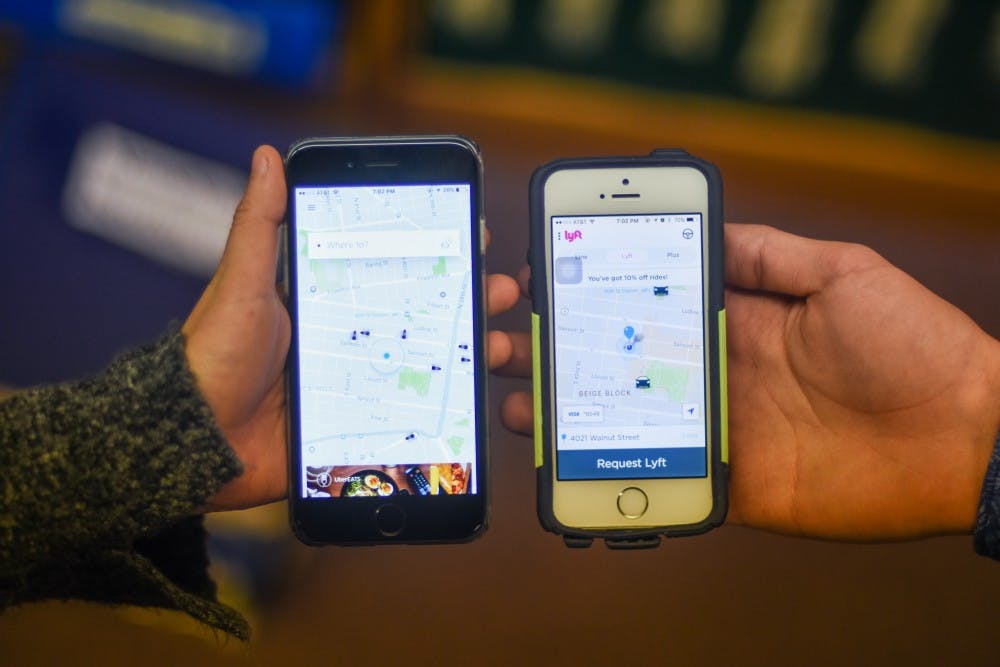When Uber CEO Travis Kalanick joined President Donald Trump’s economic advisory council, he faced criticism from many of his Silicon Valley employees.
And when the company was accused of attempting to profit from Trump’s immigration ban at New York’s John F. Kennedy International Airport, the company garnered criticism from across the nation.
The hashtag #DeleteUber became a boycott against the company, with some Penn students switching to the alternative ride-sharing service Lyft. However, campus opinions about the effectiveness of the movement vary.
“I had Uber, and I deleted it,” President of Penn Democrats and College sophomore Rachel Pomerantz said. “I think that boycotting and economic protest is really important.”
“If you’re a for-profit company, profits are going to drive what you do,” Pomerantz added. “If politically affiliating with the Trump administration is going to hurt your profit, it should hurt your profit.”
Wharton freshman Dylan Milligan, who organized many protests in his role as Penn Democrats political director, agreed.
“I was pretty mad when I heard that Uber’s CEO was going to be on Trump’s transition team,” Milligan said, referring to Kalanick’s former role.
In late January, Uber halted its surge pricing in response to cab boycott at JFK — a taxi union response the executive order. Although many considered Uber’s actions tacit support of the controversial executive order on immigration, Milligan believes it was simply a ploy for profits — one that “clearly backfired.”
“Companies are very attentive to their pocketbooks,” Milligan said. “So if you really want a company to change its policies, I think boycotts are extremely effective.”
But some Penn students aren’t buying it.
“I just think it’s kind of a self congratulatory way for Penn students to think they’re engaged — that they give a sh*t,” College sophomore and Penn Democrats Vice President Ari Goldfine said.
“If you’re willing to boycott every company Trump has touched, great for you,” she continued. “But I honestly think it’s kind of bullsh*t.”
Goldfine jabbed at the finance-centered culture of Penn’s campus and — what she perceives as — its lack of true political activism.
“How many people who deleted Uber on this campus are going to go work for Goldman Sachs?” she asked.
However, Goldfine did concede that the boycott is “not meaningless,” citing Uber’s pledge to donate to refugees and Kalanick’s decision to leave the Trump transition team.
“Joining the group was not meant to be an endorsement of the President or his agenda,” the Uber CEO wrote according to Forbes. “But unfortunately it has been misinterpreted to be exactly that.”
Wharton sophomore Caleb Carter agrees with the sentiment of Kalanick.
“It’s disappointing that people want to pressure him to step off the council,” Carter said. “I see it as an example of politics getting in the way of policy.”
Carter, a self-proclaimed “believer in the power of rational, open discussion and debate,” claimed that only engagement with Trump will prove effective in challenging his ideas.
“If immigration is important to you — and Mr. Kalanick has said multiple times, ‘immigrants are massively important to Uber’ — then, why would you pressure someone like that to give up his seat at the table?” Carter asked.
But despite the movement’s flaws, Pomerantz remains dedicated in her deletion of the app.
“Obviously it’s not a perfect form of activism,” Pomerantz said. “It’s not going to change the world.”
“But it’s a good first step,” she added, “And putting your money where your mouth is is important.”









